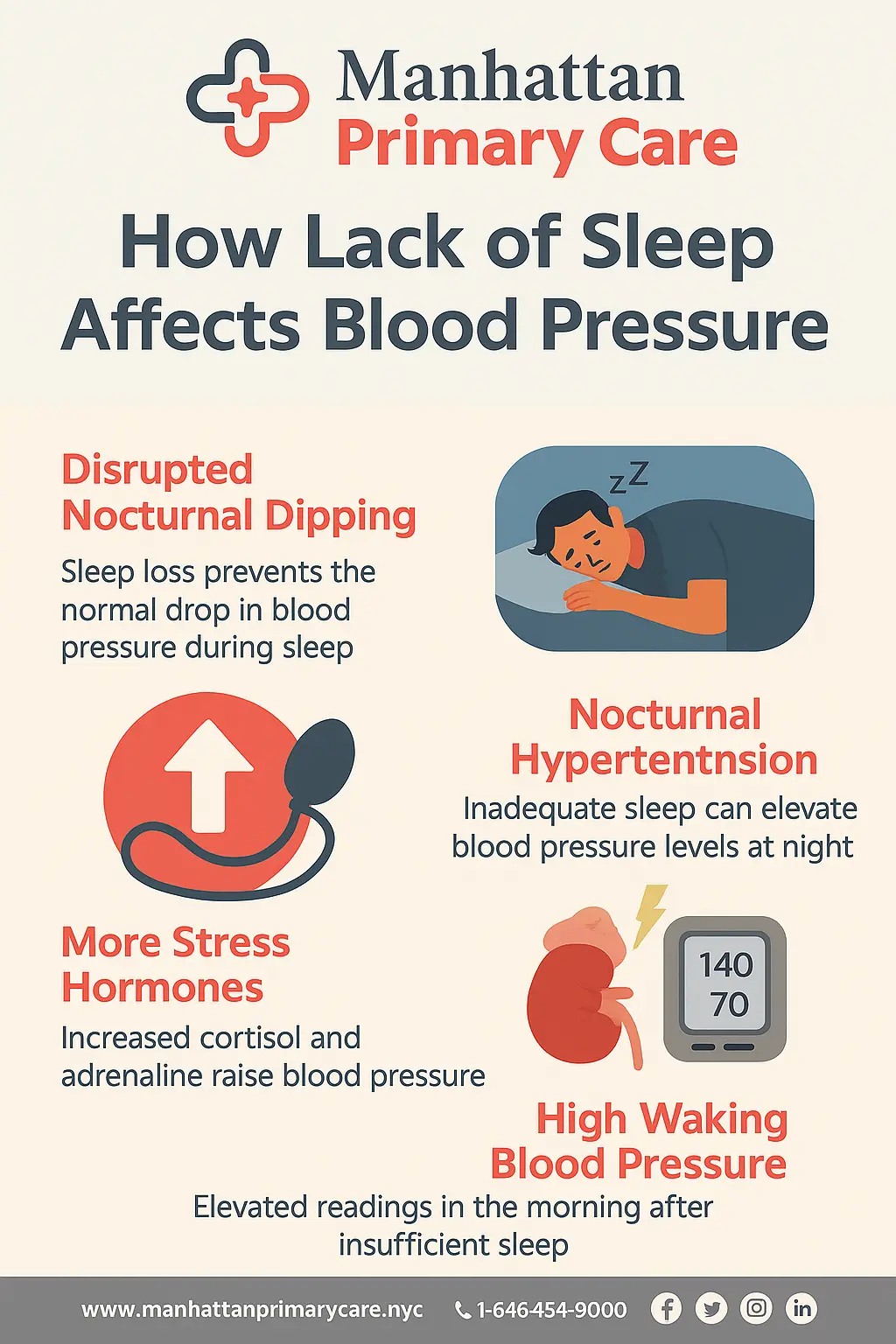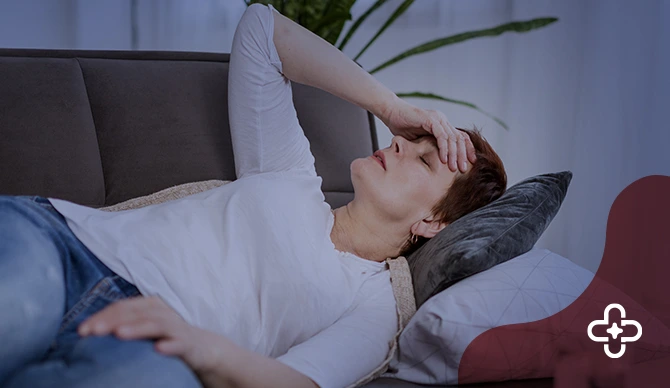Ever feel like you’re dragging through your day after a rough night of sleep? It’s not just fatigue — your heart and blood pressure might be feeling the strain, too.
In a city that never sleeps, it’s easy to overlook how essential rest really is. But if you’re regularly burning the midnight oil or struggling to get solid rest, your cardiovascular system is quietly taking a hit. Sleep isn’t just downtime, it’s a vital part of how your body regulates blood pressure, repairs tissues, and manages stress. In fact, the lack of sleep effects on the heart can be just as serious as a poor diet or sedentary lifestyle.
At Manhattan Primary Care, we help New Yorkers connect the dots between sleep, blood pressure, and heart health. Here’s what you need to know.
What Is Sleep Deprivation, and Why Does It Matter?
Sleep deprivation happens when you don’t get enough sleep; simple, but serious. It can be:
- Acute: You’ve pulled an all-nighter or only slept a few hours for a day or two.
- Chronic: You’re consistently getting less than the recommended 7–9 hours over weeks or months.
This repeated sleep loss builds up into what’s known as a sleep deficit. And yes, your body remembers those lost hours.
Ever wonder what happens if you don’t sleep for 24 hours? Even one night of sleep deprivation can:
- Spike your blood pressure
- Impair your decision-making
- Increase inflammation
- Disrupt blood sugar and hunger hormones
So it’s not just about feeling tired, you’re already putting strain on your heart, even after a single sleepless night.
How Lack of Sleep Affects Blood Pressure


During normal sleep, your blood pressure naturally dips; this is called nocturnal dipping. It’s your body’s way of resetting and allowing the cardiovascular system to recover.
When you’re sleep deprived, this pattern is disrupted. Your blood pressure stays elevated longer than it should, especially at night, a condition known as nocturnal hypertension.
That’s why you might experience high blood pressure at night or wake up with high blood pressure.
What’s happening?
- Stress hormones like cortisol and adrenaline stay elevated.
- Your sympathetic nervous system stays switched on (your “fight-or-flight” mode).
- Blood vessels don’t relax, leading to increased vascular resistance.
Over time, this disrupts your body’s ability to regulate blood pressure efficiently, day and night.
Poor Sleep and Its Impact on Cardiovascular Health
When sleep suffers, so does your heart. Chronic lack of rest has been linked to:
- Hypertension (high blood pressure)
- Arrhythmias (irregular heart rhythms)
- Increased risk of heart attacks and strokes
- Left ventricular hypertrophy (thickening of heart muscles)
The longer you’re sleep deprived, the more pressure your heart is under, literally and figuratively. It can’t rest, repair, or restore the way it needs to.
Sleep deprivation can be an early warning sign of broader health issues, including rising blood pressure or irregular heart rhythms. Through preventive care and chronic disease management, we can detect these issues early and help you take meaningful steps to protect your long-term heart health.
Hidden Effects of Poor Sleep
Ever asked yourself, Does high blood pressure make you tired? The answer: yes.
When your heart works overtime and blood doesn’t circulate efficiently, it results in:
- Chronic fatigue
- Mental fog
- Low stamina
Meanwhile, lack of sleep throws off hormones like leptin and ghrelin, which control hunger. This imbalance increases cravings for high-carb, calorie-dense foods, which can contribute to weight gain.
Also worth noting:
- Will low blood pressure make you tired? Sometimes, yes, especially if it’s caused by underlying heart issues or dehydration.
- Sleep loss also worsens mood swings, anxiety, and depression, adding even more strain on your cardiovascular system.
Our weight management and mental health support services can help you address the full spectrum of sleep-related health challenges.
Can Sleep Deprivation Cause High Blood Pressure?
Yes, Absolutely. Let’s connect the dots.
Here’s the science:
- Less sleep equals less time for your heart and vessels to recover
- Sympathetic nervous system remains active longer
- Blood pressure doesn’t get its usual nightly drop
- More inflammation equals more arterial stiffness
End result? A tired, overworked heart that’s more prone to cardiovascular fatigue and long-term damage.
How to Fix Sleep Deprivation and Protect Your Heart
The good news? Building healthier sleep habits can help regulate blood pressure and reduce strain on your heart, benefits that add up over time.
How to fix sleep deprivation:
- Stick to a regular sleep schedule (even on weekends)
- Limit caffeine and alcohol in the evening
- Shut off screens at least an hour before bed
- Create a cool, dark, quiet sleep environment
When to see a doctor:
- If you’re consistently waking up tired
- If you snore, gasp, or choke during sleep
- If you’re already being treated for high blood pressure
At Manhattan Primary Care, we offer comprehensive evaluations for sleep issues, blood pressure concerns, and overall wellness. For those showing signs of snoring, insomnia, or fatigue, we may recommend a sleep disorder evaluation or a full annual physical to get a complete picture of your health.
Conclusion
Poor sleep isn’t just tiring, it can be dangerous for your heart. Whether it’s frequent late nights, chronic stress, or undiagnosed sleep apnea, addressing your sleep is one of the best things you can do for your cardiovascular system.
If you’re dealing with chronic fatigue or nighttime blood pressure spikes, don’t ignore them. Schedule an appointment at Manhattan Primary Care today to take the first step toward better rest and better heart health.
Frequently Asked Questions
Can lack of sleep trigger headaches?
Yes. Poor sleep affects the way the brain processes pain and can lead to tension-type headaches or migraines. Inflammation, muscle tension, and neurotransmitter imbalances all play a role.
Can sleep apnea contribute to high blood pressure?
Definitely. When sleep apnea interrupts breathing, oxygen drops and your body repeatedly activates a stress response, raising blood pressure and straining the heart over time.
Can lack of sleep cause dizziness?
Yes. Sleep deprivation can affect brain function, blood pressure regulation, and hydration levels, all of which may lead to feelings of dizziness or lightheadedness, especially in the morning.
Does lack of sleep increase anxiety levels?
Absolutely. Insufficient sleep lowers emotional resilience and disrupts brain chemistry, making you more vulnerable to anxiety, irritability, and even panic symptoms.
Can high blood pressure make you feel constantly fatigued?
Yes. When blood pressure is elevated long-term, your heart works harder to circulate blood, which can leave you feeling chronically tired or physically drained, even after rest.
Sources
- Cleveland Clinic – Can Lack of Sleep Cause High Blood Pressure?
- Mayo Clinic – Sleep Deprivation and High Blood Pressure
- Centers for Disease Control and Prevention (CDC) – How Sleep Affects Your Heart
- UChicago Medicine – Sleep Prevention and Heart Disease
- NCBI – Effects of insufficient sleep on blood pressure
Disclaimer
This blog is for informational & educational purposes only and does not intend to substitute any professional medical advice or consultation. For any health-related concerns, please consult with your physician, or call 911.
